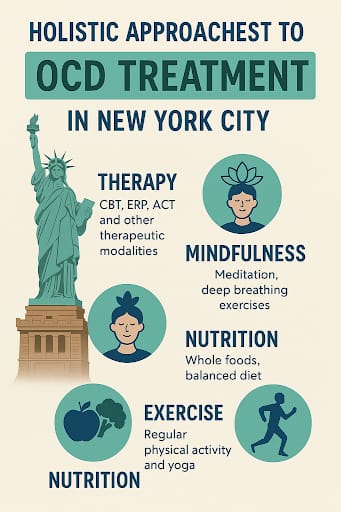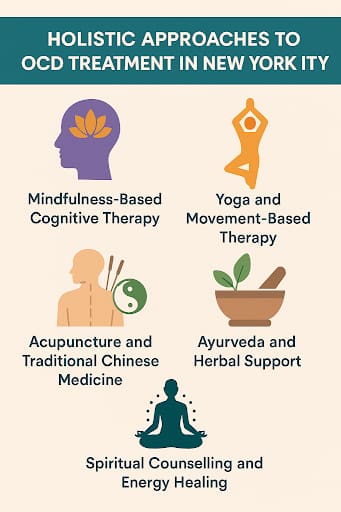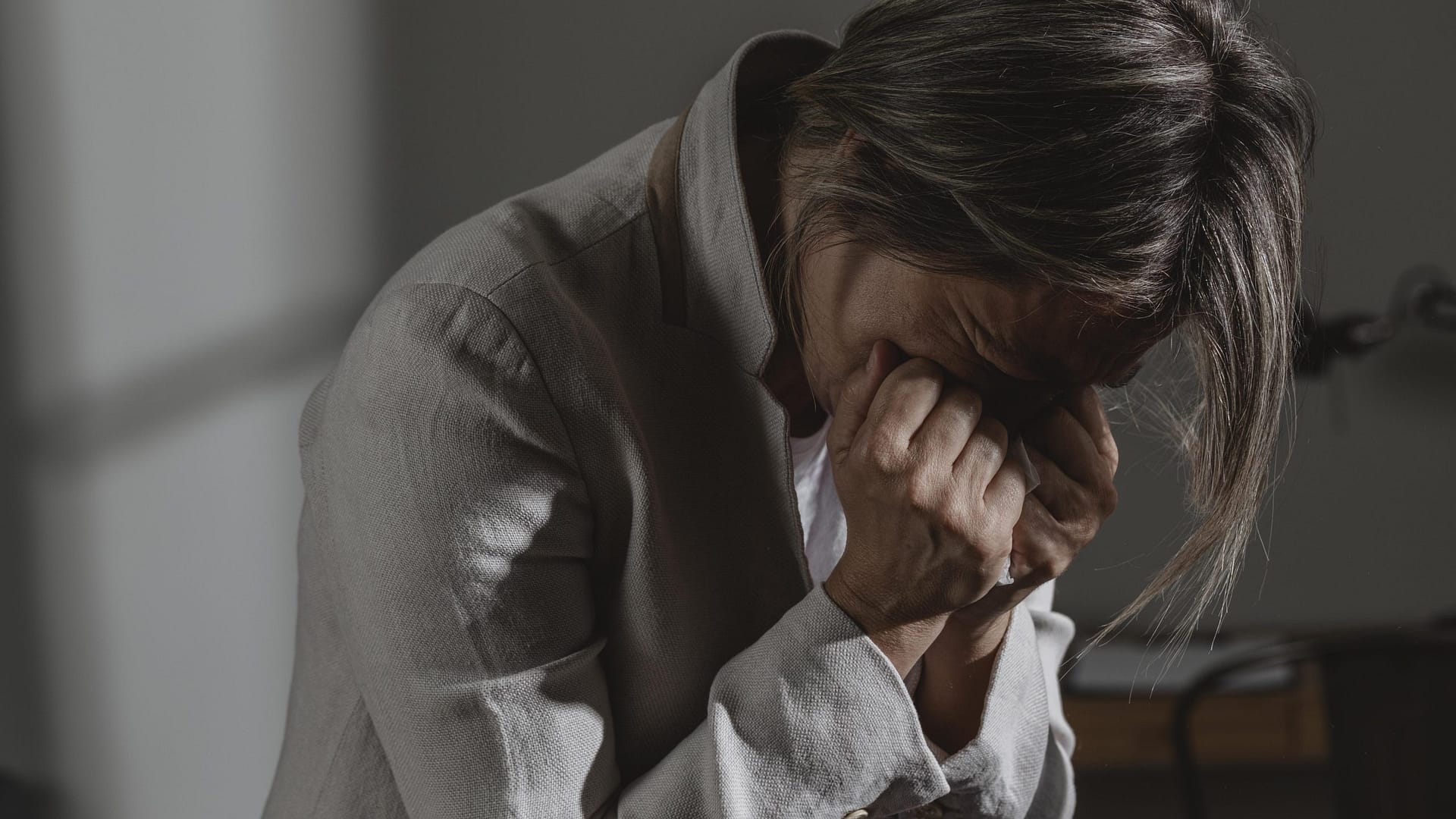
INTRODUCTION
Are you stuck in a repetitive pattern of obsessive thinking and compulsions? Living with OCD can be daunting, but you’re not alone and recovery is possible. In New York City, there is a trend towards more holistic treatments that incorporate and address the mind, body and spirit.
Using a variety of alternatives such as mindfulness practices, nutritional support, yoga, acupuncture, and integrative therapy, these modalities can provide a full approach to decreasing the impact of OCD symptoms. This blog will look at the best holistic treatments that NYC offers and how these approaches can help you regain your life.
What Is OCD?
Obsessive-Compulsive Disorder (OCD) is a common psychiatric disorder, occurring in approximately 1% to 3% of the population. Research indicates that the disorder manifests itself in two primary forms: intrusive, unwanted thoughts or “obsessions,” and repetitive acts or mental thoughts or “compulsions.”
- OCD symptoms cause significant impairment in day to day functioning, causing time-consuming habits and emotional distress.
- The origin of the disorder is complicated and multi-faceted, because OCD may have cognitive, genetic, and neurological factors.
- Because of the complexity of the disorder, correct diagnosis is a significant challenge and one of the most important criteria for a diagnosis is to be able to differentiate features of OCD from other psychiatric disorders that may share some symptoms.
At one point, OCD was classified with phobias in the DSM-III and later, in the DSM-IV, it was reclassified as an anxiety disorder. However, it is placed in its own category termed “Obsessive-Compulsive and Related Disorder” in the fifth edition of the DSM (DSM-5), [which also includes hoarding disorder and body dysmorphic disorder].
The actual reclassification reflects a progress in our understanding of the overlap in the disorder patterns, comorbid disorders, and neurobiological processes.
Understanding the Need for a Holistic Approach
Obsessive-Compulsive Disorder (OCD) affects many parts of a person’s life, such as their relationships, work, physical health, and self-esteem.
- While certain treatments such as Selective Serotonin Reuptake Inhibitors (SSRIs) may be very effective for many people, they may not always eliminate the symptoms or side effects completely.
- Some people may be left with lasting symptoms or, because of discomforting side effects, they may have to stop taking medications completely.
- Others find the mode of treatments to be not a natural approach and seek a more empowering solution for their recovery.
A holistic treatment approach can address the individual in totality, beyond the classifying diagnosis. Treatment should account for several habits – lifestyle, emotional health, physical health, nutrition, spiritual health, and environmental factors.
In a busy living place like New York City, where stress is abundant and burnout and sensory overload occur frequently, an inclusive view can succeed in addressing one’s longer-term mental health and sense of balance.
Holistic Approaches to OCD Treatment in New York City

1. Mindfulness Based-Cognitive Therapy
Mindfulness-Based Cognitive Therapy (MBCT) is a unique combination of traditional cognitive therapy and mindfulness practices to assist people with OCD.
- CBT seeks to challenge and change thinking patterns directly while MBCT promotes present-moment awareness and helps people see thoughts without judgment and or action.
- Observing thoughts allows individuals to cultivate a less obsessive thinking pattern and interpret compulsive behaviors with less reactivity.
- As mindfulness becomes a solid foundation in holistic mental health care, MBCT provides a compassionate, supportive approach for individuals seeking an overall deeper heal from OCD.
2. Yoga and Movement-Based Therapy
Yoga and movement-based therapy are more than beneficial on a physical level, allowing for more integration to be found between the mental, emotional and physical self, and a tool for mental and emotional wellness, in particular, for those suffering from OCD.
- With regular practice, the opportunities for body, mind, and spirit calm are increased, allowing for less scattered thinking, greater calm when anxious, and more mental clarity and focus.
- Yoga practice lowers cortisol levels, the body’s primary stress hormone, so there is a greater opportunity for a more stable internal landscape during practice.
- Movement based therapy practice enhances body awareness and assists in increasing the availability of some mood modulating neurotransmitters e.g., GABA, serotonin, and often assists in self-acceptance and letting go.
Each person’s experience will be slightly different, but for those with symptoms from OCD, these aspects can help greatly decrease the obsessive/compulsive cycle.
3. Acupuncture and Traditional Chinese Medicine
Acupuncture and Traditional Chinese Medicine (TCM) contribute to an established philosophy that uniquely supports managing OCD.
- TCM promotes the importance of Qi, or vital energy, and OCD is often hypothesized as a result of disharmony in the liver, heart, and spleen meridians, which could mean that when one of those pathways are broken, it will prevent one’s state of mind from being in a cogent, stable state in which they are free to manage their effect.
- As an integral part of TCM, acupuncture can be effective in controlling the nervous system, maintaining homeostasis of the hormonal cycles that fluctuate throughout the day-to-day, and provide a sense of calm.
- Research has shown that acupuncture can help reduce obsessive thinking and intrusive anxiety while improving sleep and emotional control, creating a supportive atmosphere for the overall patient pathology.
This holistic approach to an OCD model can be supportive and facilitate the overall patient intervention.
4. Ayurveda and Herbal Support
Ayurveda, the ancient healing tradition of India, addresses OCD through the principle of balancing our three doshas. Vata, Pitta, and Kapha are the doshas that Ayurvedic medicine sees as the template of the human experience; the goal of Ayurveda is to establish balance in all systems.
- OCD is often considered a Vata imbalance which can create sped-up thoughts, anxiety and a perception of mental instability.
- Ayurveda looks to bring balance back to the doshas through the utilization of many herbs and plants with calming qualities and that have qualities associated with cognitive function.
- Ashwagandha will reduce cortisol levels and get individuals to a calm state, Brahmi is meant to strengthen focus and memory; Jatamansi is used to calm and soothe and soften the nervous system, and Shankhpushpi can be beneficial to cognitive function overall.
- Collectively, these natural supports can also be thought of as calming stressors in a holistic manner for the treatment of OCD.
5. Spiritual Counselling and Energy Healing
Energetic healing modalities and spiritual counseling can help people with OCD find inner peace and a greater sense of purpose.
- Many people feel that spiritual practices offer them a connection to the self outside their symptoms that produces a sense of emotional comfort and resiliency.
- These healing techniques include Reiki therapy, chakra work, and crystal therapy and are designed to support the body by restoring its natural energy flow, which can help to ground and balance emotion.
- Energetic healing complements traditional treatment approaches to addressing OCD by providing considerations for healing beyond the physical through energy and spiritual healing methods.
- Energetic and spiritual techniques provide other methods to address OCD that can be used alongside medications, therapy, or other approaches to create a well-rounded path to wellness.
Final Thought
Holistic OCD therapy in NYC encompasses a thorough pathway towards healing, which includes the mind, body, and spirit.
- Blending mindfulness, yoga, acupuncture, Ayurveda, and spiritual counseling provide people with a wide array of methods and strategies to relieve their symptoms, and enhance their well-being.
- Integrative approaches support traditional treatments, promoting individualized care to facilitate long-term recovery and resilience as a result of the input of psycho-education and knowledge!
- Those living with OCD can acquire balance, awareness, and hope from the incorporation of holistic treatments in New York, and establish peace beyond their diagnosis.
Individuals can learn to reclaim their lives and overcome OCD and the negative consequences it represents.
Reference
- Brock, H., Rizvi, A., & Hany, M. (2024, February 24). Obsessive-Compulsive Disorder. StatPearls – NCBI Bookshelf. https://www.ncbi.nlm.nih.gov/books/NBK553162/
- Karcı, C. K., & Celik, G. G. (2020). Nutritional and herbal supplements in the treatment of obsessive compulsive disorder. General Psychiatry, 33(2), e100159. https://doi.org/10.1136/gpsych-2019-100159
- Zhang, T., Lu, L., Didonna, F., Wang, Z., Zhang, H., & Fan, Q. (2021). Mindfulness-Based Cognitive Therapy for Unmedicated Obsessive-Compulsive Disorder: A Randomized Controlled Trial With 6-Month Follow-Up. Frontiers in Psychiatry, 12, 661807. https://doi.org/10.3389/fpsyt.2021.661807
- Bhat, S. G., Arasappa, R., Jagannathan, A., & Varambally, S. (2021). Yoga therapy for Obsessive Compulsive Disorder (OCD): A case series from India. Asian Journal of Psychiatry, 62, 102739. https://doi.org/10.1016/j.ajp.2021.102739
- Traditional Chinese Medicine Practitioner Toronto, TCM Plus. (2025, May 15). OCD. https://tcmplus.com/chinese-herbal-medicine/ocd-obsessive-compulsive-disorder-treatment/
- Tian, C., Fan, Y., Xu, J., Huang, Y., Wang, W., Wang, S., Song, R., & Li, X. (2020). The efficacy and safety of acupuncture and moxibustion combined with western medicine for obsessive-compulsive disorder: A protocol for systematic review and meta-analysis. Medicine, 99(35), e21395. https://doi.org/10.1097/MD.0000000000021395






